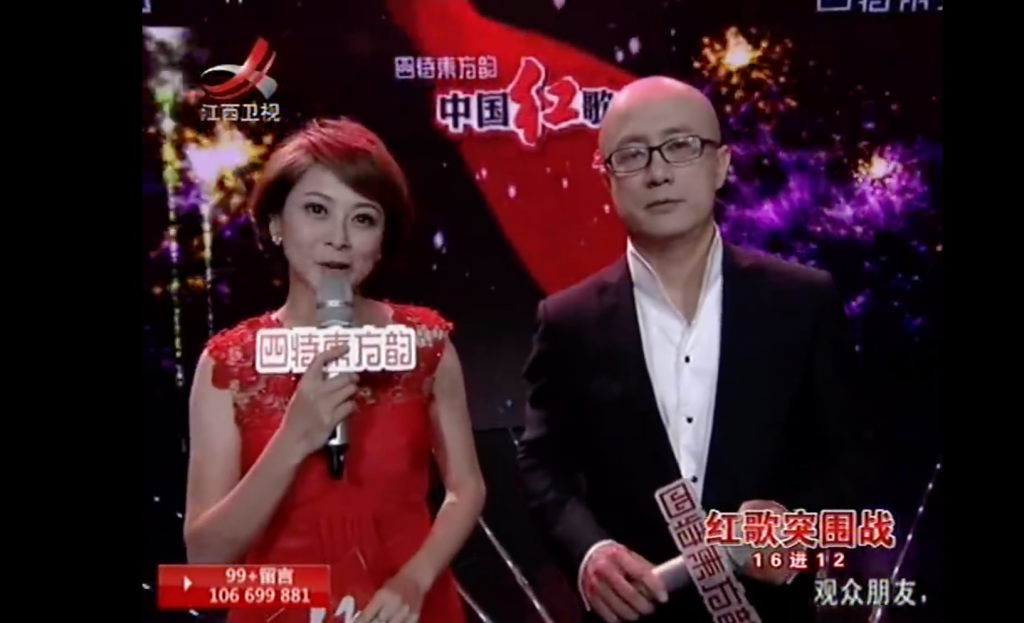A gathering in Shandong province in April 2021 to celebrate “red genes” in the run-up to the 100th anniversary of the Chinese Communist Party.
While the phrase “red genes” emerged in the second half of Hu Jintao’s second term, from 2008 through to Xi Jinping’s rise to power at the 18th National Congress of the CCP in November 2012, the phrase was never a signature of Hu’s and had not yet come fully into the mainstream political discourse. The earliest uses of the phrase appear in the PLA Daily, suggesting early and close association with military culture and history, emphasizing the PLA as a force loyal to the Party. An article appearing in the PLA Daily on June 30, 2008, “Looking Back on the Soldiers Walking Away Into the Distance” (回望遠行士兵的背影), included a passage in which it is said of the revolutionary martyr Wu Wenbin (武文斌): “The glorious tradition of the Red Army injected ‘red genes’ into Wu Wenbin’s development.” Another article in the PLA Daily on July 7, 2008, bore the headline, “The Power of ‘Red Genes’” (“紅色基因”的力量). Again, it spoke of the traditions of the Red Army as having “injected” (注入) “red genes.”
A quick review of articles in news databases during this period that include the phrase suggests that it was used in the vast majority of cases to reference the Party’s military traditions and the PLA’s allegiance to the Party and its ideals. However, there are hints of broader application too. An article from People’s Daily Online posted on October 16, 2009, to other news portal sites, including Sohu.com, looks into where Xi Jinping and Li Keqiang “received their education.” The article says of the two leaders, who by this point were merely speculative top leaders of the next generation, Xi being vice-president and Li vice-premier, includes this passage:
According to the relevant information, Comrade Li Keqiang actually does not have the most direct ‘red blood’ like Comrade Xi Jinping, but he still never forgot his ‘red genes’ as a member of the Communist Party, unlike some people who hold certain positions in the Party but always distance themselves from the red, which is one of the main reasons why we like, love, trust and admire comrades like Li Keqiang.
In retrospect, this is a tantalizing look at what we might call the “red shift” in CCP politics that began forming and strengthening from perhaps 2008 onward, corresponding also with China’s hosting of the Beijing Olympics.
Lest this important fact be forgotten, the most outspoken proponent of this red shift at this time was of course the charismatic princeling Bo Xilai, whose dramatic fall from the upper echelons of power played out in the first half of 2012. It was in July 2008 that Bo, then the Party chief in Chongqing, kicked off his red singing campaign, a populist push announced in a policy document called, “Opinion on the Widespread Launch of Programs for the Singing and Dissemination of Red Classic Songs” (关于广泛开展红色经典歌曲传唱活动的意见). If not the princeling originator of more national and mainstreamed “red gene” and “red culture” mania through his “Red Culture campaign,” lasting right up through 2012, Bo was at the very least its most dramatic and visible proponent years before Xi Jinping took up the red mantle.
While the red shift in CCP politics began in the mid-to-late 2000s, predating Xi Jinping’s rise, there is little question that Xi has made the promotion of red culture and “red genes” his own signature. Of the 178 headline appearances of the term “red genes” in the People’s Daily, just two appeared before Xi Jinping’s rise to power in late 2012.
As I have written elsewhere, however, momentum was already picking up 15 years ago behind “red songs,” which had a sentimental following through so-called “red song clubs,” or honggehui (红歌会), in places like Jiangxi, a key base of the Red Army in the early 1930s. In 2006, Jiangxi Satellite TV even launched “China Red Song Club” (中国红歌会), a singing program to commemorate the 70th anniversary of the Long March.

One scholar has written that Bo’s Red Culture campaign should be seen “not as a mass campaign but possibly the simulation of a mass campaign” This insight allows us to see the current ulitization of “red culture,” “red genes” and so on as a Party-state driven process of mass simulation by which the population is urged to identify with the CCP and its traditions as a core component of Chinese culture alongside the rich history and traditions Xi Jinping has emphasized so strongly since late 2012.
“Red genes” first emerged in the People’s Daily on November 22, 2009, in an article introducing the publication of a new 20-part book series that gathered together the stories of former soldiers and generals in the People’s Liberation Army (PLA). The People’s Daily called the series a “grand gift bestowed by military publishers,” the book having been released by the PLA Publishing House. The paper noted that the collection had been unveiled to commemorate the 60th anniversary of the founding of the PRC.

The early association of the phrase with the Party’s 60th anniversary and what was billed at the time in Party-state media as well as international media as the largest military parade in history, places it solidly within contemporary efforts by the CCP to utilize and defend its revolutionary history as a resource to inspire obedience and encourage Chinese to identify themselves with the regime.

David Bandurski
The CMP Dictionary
C
D
F
G
M
N
P
S
- Scaling the Wall
- Science
- Second-Generation Reds
- Security
- Seeking Progress in Stability
- Seeking Truth From Facts
- Self-Revolution
- Seven Bottom Lines
- Six Adheres
- Smart Governance
- Sneaky Visit
- So-Called
- Socialite
- Soft Resistance
- Soul and Root
- Soundless Saturation / Quietly Nourishing
- Sovereignty
- Speaking Politics
- Streamlining Services
- Strong Cyber Power